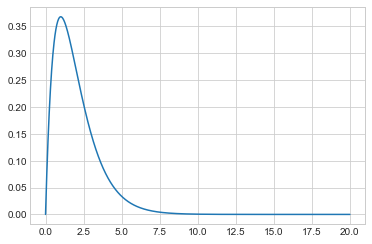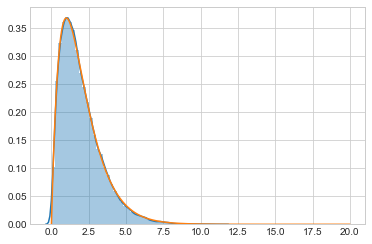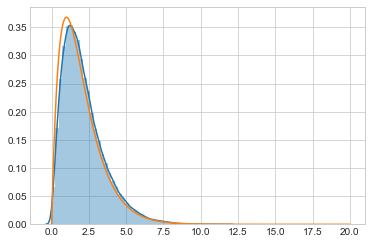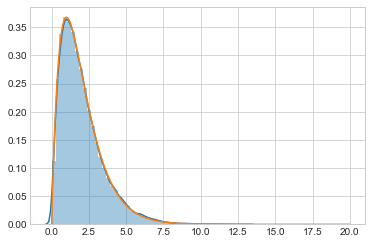Keywords: sampling | mcmc | metropolis | rejection sampling | normalization | metropolis-hastings | Download Notebook
Contents
From https://darrenjw.wordpress.com/2012/06/04/metropolis-hastings-mcmc-when-the-proposal-and-target-have-differing-support/
%matplotlib inline
import numpy as np
import scipy as sp
import matplotlib as mpl
import matplotlib.cm as cm
import matplotlib.pyplot as plt
import pandas as pd
pd.set_option('display.width', 500)
pd.set_option('display.max_columns', 100)
pd.set_option('display.notebook_repr_html', True)
import seaborn.apionly as sns
sns.set_style("whitegrid")
As a simple example, lets target Gamma(2,1) or $xe^{-x}, x \gt 0$.
target = lambda x: x*np.exp(-x)
xx = np.linspace(0, 20, 1000)
plt.plot(xx, target(xx));

Using Metropolis to sample
Here, copied from before, is the metropolis code.
def metropolis(p, qdraw, nsamp, xinit):
samples=np.empty(nsamp)
x_prev = xinit
for i in range(nsamp):
x_star = qdraw(x_prev)
p_star = p(x_star)
p_prev = p(x_prev)
pdfratio = p_star/p_prev
if np.random.uniform() < min(1, pdfratio):
samples[i] = x_star
x_prev = x_star
else:#we always get a sample
samples[i]= x_prev
return samples
def prop(x):
return np.random.normal(x, 1.0)
out = metropolis(target, prop, 100000, 1.0)
sns.distplot(out)
plt.plot(xx, target(xx));

Since we use the functional form directly without checking for $x \gt 0$, we are not sampling on the correct support. This does not land up costing us, as the acceptance ratio being negative the first time we sample a negative $x$ will ensure that we never sample a negative $x$. We would be better using scipy.stats built in gamma support.
We have seen this before, in sampling from a weibull using a normal as well. Also from sampling from a function only defined on [0,1]. Some people consider the lax use of a larger-support proposal a bug. But it does not bite us anywhere but efficiency due to the mechanism of the acceptance ratio.
Let us see what this lack of efficiency is:
def metropolis_instrument(p, qdraw, nsamp, xinit):
samples=np.empty(nsamp)
x_prev = xinit
acc1 = 0
rej_neg = 0
for i in range(nsamp):
x_star = qdraw(x_prev)
p_star = p(x_star)
p_prev = p(x_prev)
pdfratio = p_star/p_prev
if np.random.uniform() < min(1, pdfratio):
samples[i] = x_star
x_prev = x_star
acc1 += 1
else:#we always get a sample
if x_star < 0:
rej_neg += 1
samples[i]= x_prev
return samples, acc1, rej_neg
out2, a1, rn = out = metropolis_instrument(target, prop, 100000, 1.0)
a1/100000, rn/(100000 - a1)
(0.7298, 0.3654700222057735)
Thus, out of a 73% acceptance, a full 36% is wasted on proposing negatives.
A wrong built-in regection sampler
You might think that simply rejecting is ok, but you would be wrong. You are then sampling from some other distribution.
def metropolis_broken(p, qdraw, nsamp, xinit):
samples=np.empty(nsamp)
x_prev = xinit
for i in range(nsamp):
while 1:
x_star = qdraw(x_prev)
if x_star > 0:
break
p_star = p(x_star)
p_prev = p(x_prev)
pdfratio = p_star/p_prev
if np.random.uniform() < min(1, pdfratio):
samples[i] = x_star
x_prev = x_star
else:#we always get a sample
samples[i]= x_prev
return samples
out3 = metropolis_broken(target, prop, 100000, 1.0)
sns.distplot(out3)
plt.plot(xx, target(xx));

Fix using MH
To fix this use Metropolis-Hastings instead and sample from a distribution eith the correct support, a truncated normal. Since the truncated normal is not symmetric:
we must use a MH Sampler
def metropolis_hastings(p,q, qdraw, nsamp, xinit):
samples=np.empty(nsamp)
x_prev = xinit
accepted=0
for i in range(nsamp):
while 1:
x_star = qdraw(x_prev)
if x_star > 0:
break
p_star = p(x_star)
p_prev = p(x_prev)
pdfratio = p_star/p_prev
proposalratio = q(x_prev, x_star)/q(x_star, x_prev)
if np.random.uniform() < min(1, pdfratio*proposalratio):
samples[i] = x_star
x_prev = x_star
accepted +=1
else:#we always get a sample
samples[i]= x_prev
return samples, accepted
from scipy.stats import norm
def prop2(x):
return x + np.random.normal()
def q(x_prev, x_star):
num = norm.cdf(x_prev)
return num
out4, _ = metropolis_hastings(target, q, prop2, 100000, 1.0)
Now we get the correct output!
sns.distplot(out4)
plt.plot(xx, target(xx));
